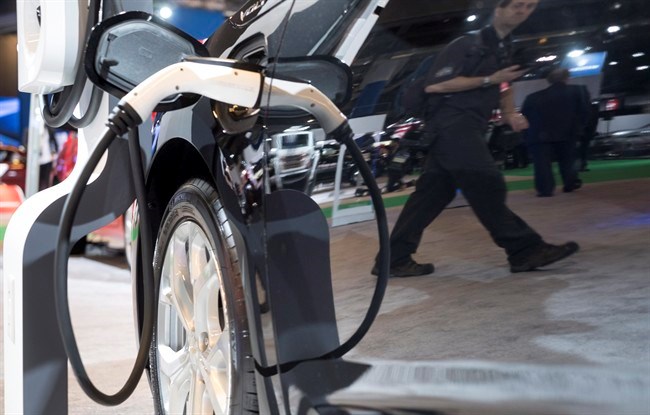Electric vehicle drivers can now tap into generous government rebates if they install a medium- speed charger at their home, workplace or condo complex.
Purchase and installation of a Level 2 charger at a single-family home ranges from $700 to $2,000. B.C.’s CleanBC electrification program will rebate $350 of that.
The rebate for a multiple-user charging system installed at a condominium, apartment building or workplace is $2,000. Such systems cost between $2,000 and $12,000 to buy and install.
“Installing charging stations is something more and more British Columbians want to do when they go electric, making it more affordable,” said Energy Minister Michelle Mungall,
The $4-million CleanBC Home and Workplace EV Charging Program was effective as of Thursday and applies to systems installed with documentation submitted by March 31, 2020.
A 240-volt Level 2 charger can recharge an electric vehicle battery in about three to four hours, compared with up to 16 hours for a Level 1 charge from a standard household outlet.
“At-home charging is not only convenient for EV owners, with B.C. Hydro’s low electricity rates, it also offers significant savings over fuelling a gas-powered vehicle,” said B.C. Hydro CEO Chris O’Riley.
B.C. Hydro and Fortis B.C. will administer the program in their respective service areas.
The province’s CEVforBC program also offers rebates up to $3,000 to people who purchase a new battery-electric vehicle, hydrogen-fuel-cell electric or long-range plug-in hybrid-electric vehicle. A federal rebate program offers up to $5,000 back on qualifying battery-electric and hydrogen-fuel-cell vehicles and $2,500 to $5,000 on plug-in hybrid vehicles.
Vehicles must cost less than $45,000, or less than $55,000 for vehicles with more than seven seats.
B.C.’s Scrap-It program offered another $6,000 toward the purchase of new electric vehicles when the buyer retires a high-emitting vehicle at the same time. The program is currently out of funds.
Spurred by federal and provincial rebates, electric-vehicle sales nearly tripled in the second quarter of 2019 in B.C. compared to the same period last year, according to Electric Mobility Canada. British Columbians purchased more than 9,000 EVs in the first half of this year.
The 66,000 electric and hybrid cars and trucks registered in B.C. represent about 1.9 per cent of our total fleet of 3.45 million, up from 1.55 per cent in 2017, according to ICBC.
About 70 per cent of British Columbians remain skeptical of electric vehicles due to doubts about their range for out of town trips, according to a poll commissioned by B.C. Hydro. Many believe the need to find charging stations and charge their vehicle during a trip will add significantly to the duration of the journey.
There are about 270 fast chargers along B.C. motorways, including 58 operated by B.C. Hydro. Chargers operated by the Crown utility are concentrated along popular routes, including Vancouver to Kelowna, Abbotsford to Whistler, Kamloops to Vancouver, Cranbrook to Revelstoke, and Victoria to Tofino.
Fast chargers can top up an EV battery to 80 per cent in 20 to 30 minutes.
About 1,700 charging stations have been installed in B.C.



